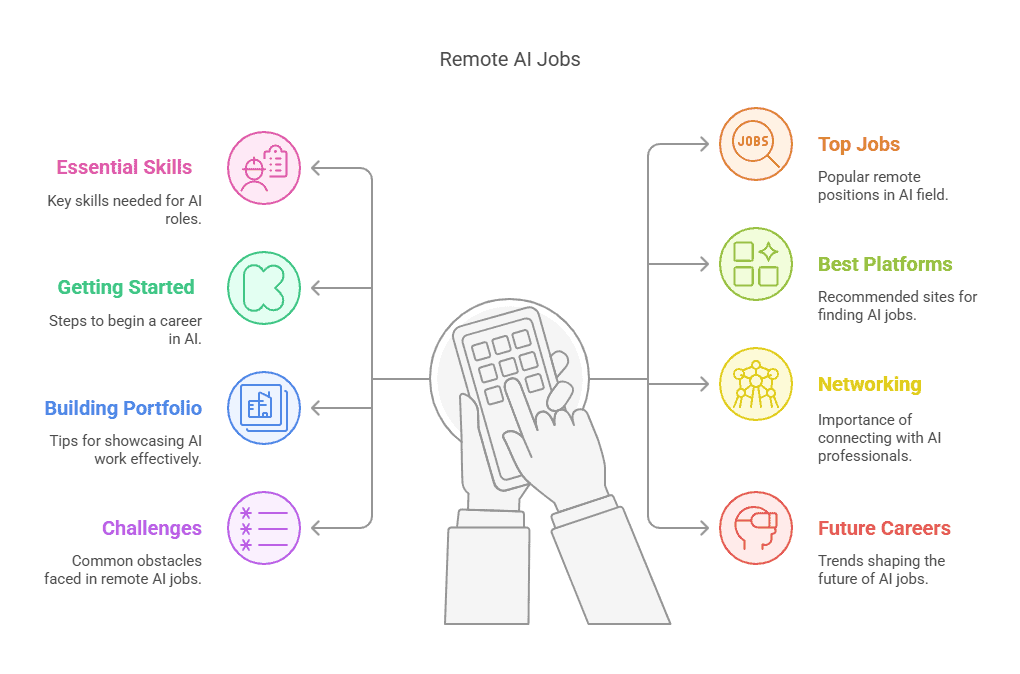Introduction
Artificial Intelligence (AI) is one of the fastest-growing industries, offering lucrative remote job opportunities. With the rise of cloud computing and collaborative AI tools, working from anywhere is more feasible than ever.

Also Read: History of Artificial Intelligence
1. Essential AI Skills for Remote Jobs
To land a remote AI job, you need to master essential AI-related skills such as:
- Machine Learning (ML)
- Deep Learning (Neural Networks)
- Python, TensorFlow, PyTorch
- Natural Language Processing (NLP)
- Computer Vision
- Big Data Analytics
2. Top Remote AI Jobs
Here are some of the most in-demand remote AI job roles:
| Position | Average Annual Salary (USD) |
| AI Engineer | $120,000+ |
| Data Scientist | $110,000+ |
| Machine Learning Engineer | $130,000+ |
| NLP Engineer | $125,000+ |
| AI Researcher | $140,000+ |
| Computer Vision Engineer | $130,000+ |
3. How to Get Started
Follow these steps to build a remote AI career:
- Learn AI Fundamentals – Take AI courses on Coursera, Udemy, or edX.
- Get Certifications – Earn AI certifications from Google, IBM, or Microsoft.
- Work on AI Projects – Build real-world AI applications and showcase them on GitHub.
- Contribute to Open-Source AI Projects – Gain hands-on experience by working with AI communities.
- Apply for Remote AI Jobs – Use job platforms like LinkedIn, Toptal, and Upwork.
Also Read: Understanding the Basics of Artificial Intelligence
4. Best Platforms for Remote AI Jobs
Here are some great websites to find AI job opportunities:
5. Building an AI Portfolio
A strong AI portfolio increases your chances of getting hired. Include:
- AI projects on GitHub
- Machine learning models trained on real-world datasets
- Contributions to open-source AI communities
- AI blogs, research papers, or technical writing samples
6. Networking & AI Communities
Join AI communities to learn and grow your network:
- GitHub – Contribute to AI projects.
- Kaggle – Participate in AI competitions.
- Reddit AI Subreddits – Discuss AI trends.
- AI Alignment Forum – Learn from AI researchers.
7. Challenges & Solutions
Common Challenges in Remote AI Careers
- High Competition – Build a unique AI portfolio.
- Technical Complexity – Take advanced AI courses.
- Remote Work Isolation – Engage with AI communities.
8. Future of Remote AI Careers
The demand for remote AI jobs is expected to grow significantly, with automation and AI-driven solutions dominating industries like healthcare, finance, and e-commerce.
Also Read: Top 10 Artificial Intelligence Applications 2025
Frequently Asked Questions (FAQs)
1. Can I start an AI career without a degree?
Yes, many AI professionals learn through online courses and certifications.
2. How much do remote AI jobs pay?
Salaries range from $80,000 to $150,000+, depending on expertise and job role.
3. What industries hire remote AI professionals?
Tech, finance, healthcare, e-commerce, and cybersecurity sectors actively hire remote AI experts.
4. How much time it take to become an AI specialist?
It depends on prior experience, but 6 months to 2 years of consistent learning is common.
5. What programming languages are best for AI development?
Focus on Python, R, SQL, and Java for AI development.
6. What are the best AI certifications?
Certifications from Google AI, IBM, Microsoft, and DeepLearning.AI are highly valued.
References
- World Economic Forum – Future of Jobs Report
- Coursera – AI & Machine Learning Courses
- LinkedIn – AI Job Trends & Hiring Insights
- Kaggle – AI Competitions & Datasets
- GitHub – Open Source AI Projects
- Forbes – AI Job Market Growth
- Write Remotely – Jobs Listing


 Owner of Write Remotely. Connecting businesses with talented writers and empowering remote work.
Owner of Write Remotely. Connecting businesses with talented writers and empowering remote work.

